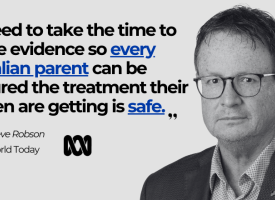Dr Pecoraro - RN Drive - Male Gynaecologists
Transcript: AMA Board Chair, Associate Professor Gino Pecoraro, Radio National, RN Drive with Patricia Karvelas, Monday 17 June 2019
Subject: Male Gynaecologists
PATRICIA KARVELAS: Are there some professions that men shouldn't pursue? It's a controversial proposition. But an article in The Australian newspaper by Nikki Gemmell questioned why male gynaecologists and obstetricians choose their profession. The article mentioned several recent high-profile cases of abuse, as well as some anecdotal stories about women being made to feel uncomfortable or unsafe by their male doctors. It's caused a huge amount of controversy online, and my next guest has registered a complaint with the Australian Press Council in response. Associate Professor Gino Pecoraro is a practising obstetrician and gynaecologist in Brisbane. He's also a health columnist for The Courier-Mail. Welcome to the program.
GINO PECORARO: My pleasure to be here. Thank you for asking me.
PATRICIA KARVELAS: So, you've registered a complaint about Nikki Gemmell's article with the Australian Press Council. Why are you upset about it?
GINO PECORARO: I'm disappointed that so little research was actually done into the subject that she's writing a column about. Although, she tried to couch it in a question, “trying to find more information”, but I just think that was a little bit too cute. But it's really, really unacceptable, and it's insulting not just to the thousands of gynaecologists that we've got working in Australia, but also to their patients. To suggest in this day and age, that somebody's gender, or even sexual preference, should play a role in which careers you choose is simply not acceptable. And I think that journalists need to be held to the same level of accountability as every other professional group. And so, while I'm waiting for her to write the apology, and I look forward to reading that, I do think that something further needs to be done.
PATRICIA KARVELAS: Okay, you say journalists. This is a column. It's her view based on her conversations she's had with women. Doesn't she have a right to her view?
GINO PECORARO: You have a right to have a point of view, absolutely. But if you're going to promulgate that point of view, I would expect you to do a little bit of research and not write something which is so obviously distressing to so many people, it's simply factually incorrect. Look, I write a column for a newspaper on health matters as well. But I wouldn't dream of writing something I hadn't researched, or had at least some basic knowledge about. When in her research of this column, did she actually ask a male gynaecologist? But to suggest that any professional would choose their profession for voyeuristic reasons, or because they wanted to exert control over someone else, that's gone too far, and that does need to be called out.
PATRICIA KARVELAS: Many women do prefer seeing women gynaecologists- and I make that statement very openly based on anecdotes; again, just in terms of this fact line, these are women I've spoken to. And that's for a range of, sometimes, personal reasons. Is there a problem with that in your view?
GINO PECORARO: There isn't a problem with it. But can I just point out some facts, and some evidence? This is a question that is asked of women in gynaecological services all over the world repeatedly. I was involved in some research done at the hospital that I was working at, and the results there was that it was equal thirds - one-third wanted women, one-third actually wanted men, and one-third didn't care. There's actually been last year, a large international, multi-variant analysis of a whole systematic review of studies, and actually we found that anywhere between 7 to 30 per cent of women preferred men; around half of the women questioned preferred women. But most of the women, when you broke it down, said they really didn't pick their caregiver based on their gender, which is absolutely the way it should be. We shouldn't be telling men they can't be gynaecologists - or women, for that matter, that they can't be engineers or lawyers. It's just wrong.
PATRICIA KARVELAS: The article concludes with a wish for more women to enter the profession. So, help me out here. As you say, you're trying to base what you say on facts. Is there an issue with women in this area?
GINO PECORARO: No. In fact, there isn't. And that's another area that is sadly lacking in her research. We know that in Australia and New Zealand, greater than 85 per cent of our trainees are women. So, there isn't actually a shortage of women. What we do have is a gender disparity, and this is something that has come to the attention of the College as something that needs to be addressed.
We do need to encourage more men to come into the specialty for a couple of reasons. Firstly, because we know that anywhere between 7 to 30 per cent of women prefer to be seen by a male gynaecologist. But also, from the time when I was on the Board of the College and we took a survey of our members, we found that of the 25 per cent of trainees who are prepared to travel away from the eastern seaboard capital cities and provide women with their services, three-quarters of those were men. So, if we don't encourage enough men to come and do the extensive training required, then we could actually end up having a problem with getting people to go further afield from the major capital cities. There's no right or wrong. It's, I think, people who want to do the under-training and are interested in helping women through what is a very, very important time in their lives should be allowed to perform that vital function and not have their integrity or their motives questioned.
PATRICIA KARVELAS: Thank you so much for joining us.
GINO PECORARO: My pleasure.
PATRICIA KARVELAS: And that's Associate Professor Gino Pecoraro. He's a practising obstetrician and gynaecologist in Brisbane. He's also a health columnist for The Courier-Mail.
18 June 2019
CONTACT: John Flannery 02 6270 5477 / 0419 494 761
Maria Hawthorne 02 6270 5478 / 0427 209 753



